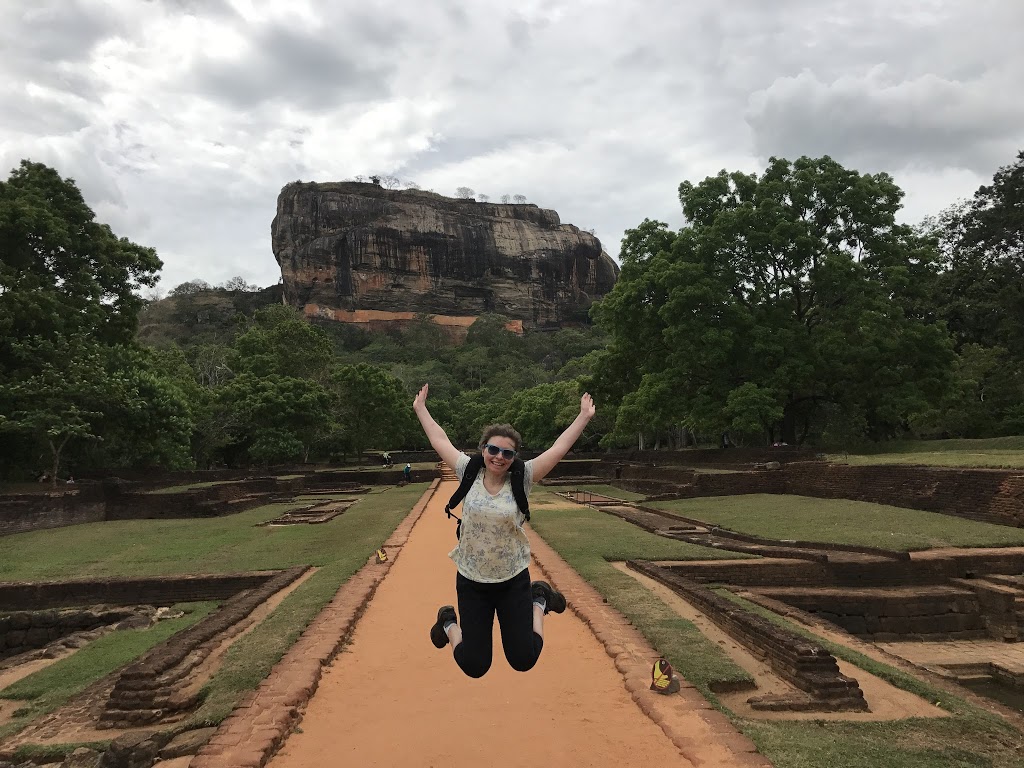
Sri Lanka’s ‘Cultural Triangle’: Part 1 – A big rock and some caves
| Very excited to be at Sigiriya |
We spent our first four nights in the country in Habarana – a town in an area of Sri Lanka known as the ‘Cultural Triangle’.
Our first morning in Habarana was spent there. It was a place I identified, as definitely ‘on the list’ from the very beginning of my travel planning to Sri Lanka and I was very excited to visit.
| On our way, our tuk-tuk driver found us some good photo spots! |
On the top of the rock are ruins, which depending on who you listen to, were either a fortress-palace built during the reign of King Kassapa AD 477-495 (the established view) or a monastery (as has been argued more recently by archaeologists).
| Ruins at the top (the Buddhist monks are trying to influence your views on what was here!) |
| Lily pond |
| Gardens from above |
| James contemplating the landscape |
We spent the morning climbing the rock, admiring the views from the top, walking round the gardens and then visiting the well laid out museum.
It was very windy up top. Very windy.
| VERY WINDY |
But the views of the surrounding plains were incredible.
| One of my favourite pictures! |
The other rock
If Sigiriya whets your appetite for climbing hardened magma plugs, you’re in luck!
There’s another very nearby, called Pidurangala. Its much cheaper and much quieter than its famous neighbour and it’s also possible to climb it in time for sunrise. We missed it off, but this post by Man vs Globe explains why you shouldn’t. Apparently, there’s a great view of Sigiriya from its less famous neighbour. Ah well, its always good to have an excuse to go back!
| The buildings around the cave temples |
I actually didn’t have any particularly great expectations of them. I hadn’t read that much about them. I just thought that given where Dambulla was, it logistically made sense to visit them after the big rock, before heading back to Habarana.
However, I was very impressed by the huge Buddha statues and the beautiful paintings on the rocks inside the cave temples and couldn’t stop taking snaps.
The photos don’t quite do it justice, which may have been why I hadn’t been ‘that’ excited about going. (But I’d recommend going if you can!)
I was particularly taken by the decorations on the feet of the lying down Buddha.
I was a little surprised by the claim near the temple that we were witnessing the biggest Buddha statue in the world.
I felt sure that this claim to fame would have come up in some of my pre-travel research. Sure enough, a quick google confirmed my scepticism – 30 metres just ain’t gonna cut it among the several Buddha statues I found online of 70 or so metres high.
It’s still pretty big though! On the other side of the courtyard, facing the big Buddha is a huge golden stupa. Size seems to be the thing here!
We stood and watched while monkeys tore apart and ate the banana and flower offerings that had been laid down in the shrine next to the stupa. Those cheeky monkeys!
Before heading back to Habarana, we had a little nosy around the wholesale fruit and veg market in Dambulla, It was interesting to see the mountains and mountains of different fruits and veg. Unfortunately, our lack of Sinhala meant that we couldn’t find out what some of the more unusual looking produce was. It is worth a little mosey around though, if you’re passing by.
Entry fee to Sigiriya – 30US$
Entry fee to Dambulla cave temples – 1500 Sri Lankan rupees
Sri Lanka’s ‘Cultural Triangle’: Part 3 – A massage and a herd of elephants
Where we stayed – Sri Lanka
Sri Lankan beach time